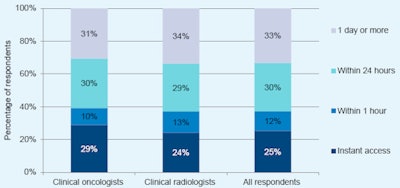
Systems for sharing medical images and reports between hospitals require a major overhaul because delays in accessing data online are causing immense harm to patients, a new 31-page report from the U.K. Royal College of Radiologists (RCR) has found.
The RCR document, "It's good to share: medical image and report exchange between U.K. health care providers," was published last week. It reveals that problems with sharing vital images between doctors and hospitals are common across the National Health Service (NHS).
The report is based on an online survey conducted between 23 February and 9 March 2016 of 172 clinical oncologists and 610 clinical radiologists working as NHS consultants. The questions did not focus on the technical elements in sharing information among health service providers, although some respondents clearly had specialized knowledge and offered solutions based around IT systems, architecture, and interoperability. Instead, the research focused on the experiences of clinicians as users of these systems, in accessing and sending images and reports from and to hospitals, trusts (or groups), and health boards external to their own.
Insight into these experiences is important given that these clinicians are front-line medical specialists delivering patient care and require the tools and information to help with their decision-making and treatment planning, the authors wrote.
 Top: Length of time taken by respondents to access external radiology images. Bottom: Length of time taken by respondents to access external radiology reports. All figures courtesy of the RCR.
Top: Length of time taken by respondents to access external radiology images. Bottom: Length of time taken by respondents to access external radiology reports. All figures courtesy of the RCR.The results show cancer specialists have to make decisions about patient care without vital information from previous imaging examinations because systems are not joined up. This can lead to delays in treatment and even the wrong treatment being offered to some patients.
Among the key findings of the report are:
- Nearly all survey respondents experience some difficulty with accessing scans or reports from other organizations on a daily or weekly basis.
- Only a quarter of clinical oncologists and radiologists have instant access to external images and reports.
- Two-thirds of respondents rely on costly and inefficient manual processes for image retrieval.
- More than half of clinical oncologists reported that patient care had suffered once or more in the past 12 months as a result of images and/or reports not being available.
"Joining up care between different organizations is a key priority for the NHS," said RCR President Dr. Giles Maskell. "Our survey has found major problems with sharing images between different providers. This is causing not just inefficiency, but real harm to patients. The technical solutions are out there and we are producing a report later this year proposing what can be done with a little more investment -- and crucially -- the will at national level to make it happen."
 The technical solutions are out there, Dr. Giles Maskell believes.
The technical solutions are out there, Dr. Giles Maskell believes.The RCR plans to publish a companion document later in the year setting out its proposals for solutions to the problems identified in the report.
"Some U.K. countries and regions have much more functional image-sharing systems than others and there are lessons to be learnt here," noted Dr. David Bloomfield and Dr. Andrew Smethurst, joint RCR medical directors of professional practice, in the foreword to the report. "The solutions to the problems highlighted in this report are going to be very largely technological and the newly created Radiology Informatics Committee of the RCR is working with industry and standards bodies to produce a document illustrating these solutions in 2016."
The RCR acknowledged the support of AuntMinnieEurope.com columnist and editorial advisory board member Dr. Neelam Dugar, who is chair of the Radiology Informatics Committee, and Don Liu, RCR's data, audit, and surveys manager.
To download a free copy of the report from the RCR website, click here.



















